LATEST NEWS


The immigration reform bill likely to pass the Senate this week will pick up a few more votes because it commits the government to building a longer fence. Thanks to a Republican amendment, workers will erect an additional 700 miles of fencing along the U.S.-Mexico border.
But if we’re going to build a fence, is that really where it should go? If we have apprehensions about our neighbors to the south, are those the neighbors — and is that the south — that really present the United States with its most difficult problems?
By now, even the economics profession concedes that our openness to the developing world — call it the Global South — has played a role in depressing the incomes of U.S. workers. And depressed they are: Hourly wages fell 3.8 percent in the first quarter of 2013, the biggest drop since the government began measuring in 1947.


Yesterday’s historic Supreme Court rulings supporting marriage equality marked an important step forward for justice for all workers. Labor unions in California and across the nation have been strongly united for marriage equality for years. In fact, the California Labor Federation and 50 other labor organizations signed on to an amicus brief in support of marriage equality back when the challenges to Prop 8 first began nearly five years go.
Tim Paulson of the San Francisco Labor Council, which was one of the most vocal parties to the amicus brief, celebrated the announcement, which happens to coincide with the 43rd annual San Francisco Pride celebration that kicks off this weekend.
Here in San Francisco, where it all started, workers are celebrating this great civil rights victory. As we say, “an injury to one is an injury to all.” Now all of our LBGT members and their partners can be treated with equal respect.
» Read more about: Labor Pride: Unions Celebrate Marriage Equality Ruling »
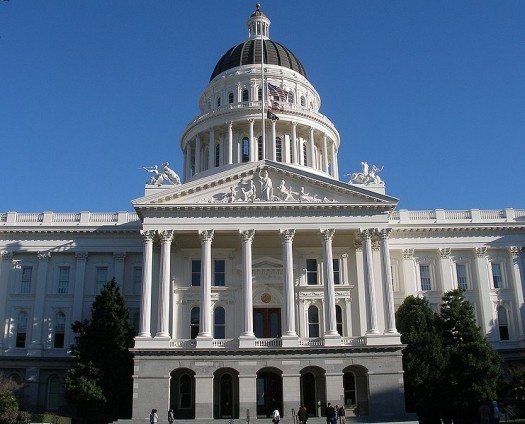

(Editor’s Update: Luke Dowling’s June 25 piece below references Governor Jerry Brown’s proposal to restructure California’s controversial enterprise zone program. Last night the state Senate approved Brown’s initiative to transform the program. The next move rests with the Assembly, which is considering a Brown-backed measure that would create an alternative to the program.)
The fight over California’s enterprise zone program continued last Friday when John Burton, chairman of the California Democratic Party, proposed a measure for the November 2014 ballot which would give voters the power to eliminate the zones.
This proposal echoes concerns contained in Frying Pan News reporter Gary Cohn’s exposé of the rampant exploitation of the enterprise zone program. These zones are intended to foster the creation of jobs in economically distressed areas of the state by providing financial incentives to companies to move to those areas.
» Read more about: State Senate Approves Enterprise Zone Overhaul »


Reactions to the Supreme Court’s ruling Tuesday that halts the use of a key provision in the landmark Voting Rights Act (VRA) included disappointment, motivation to continue community organizing and a sense that it was fair.
The Associated Press and Equal Voice News collected comments from elected officials and community leaders, who work directly on voter engagement issues and in key states affected by the Supreme Court’s decision.
President Barack Obama:
“I am deeply disappointed with the Supreme Court’s decision today… Today’s decision invalidating one of its core provisions upsets decades of well-established practices that help make sure voting is fair, especially in places where discrimination has been historically prevalent.”
Scott Douglas, executive director of Greater Birmingham Ministries in Alabama:
“Our deepest concern is that if a state like ours had the gall to pass voter suppression and racially-discriminatory laws under the scrutiny of Section 5 of the VRA,
» Read more about: Reactions to High Court’s Voting Rights Act Ruling »
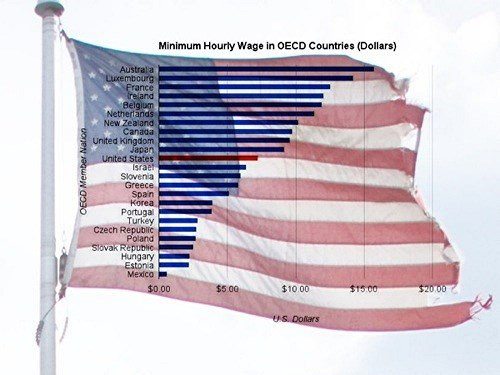
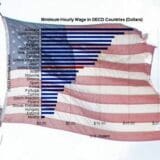
Business groups and their political allies have consistently attacked the idea of a minimum wage ever since President Franklin D. Roosevelt proposed it during the Depression to help stimulate the economy. And yesterday — the 75th anniversary of the Fair Labor Standards Act (FLSA), which FDR signed on June 25, 1938 to establish the minimum wage as well as the eight-hour day, paid overtime and child labor protections — their contemporary counterparts are still at it.
A recent report by the National Employment Law Project and the Cry Wolf Project, Consider the Source: 100 years of Broken Record Opposition to the Minimum Wage, chronicles the history of unchanging sky-is-falling rhetoric by business interests opposed to minimum wage laws.
Even today, business groups and their political allies still complain that the minimum wage violates employers’ freedom to set pay levels, forces business firms to cut jobs or even file for bankruptcy,
» Read more about: Raising the Minimum Wage for the Most Good »

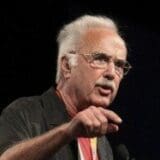
The fight over California’s enterprise zone program continued last Friday when John Burton, chairman of the California Democratic Party, proposed a measure for the November 2014 ballot which would give voters the power to eliminate the zones.
This proposal echoes concerns contained in Frying Pan News reporter Gary Cohn’s exposé of the rampant exploitation of the enterprise zone program. These zones are intended to foster the creation of jobs in economically distressed areas of the state by providing financial incentives to companies to move to those areas. However, a study by the non-partisan Public Policy Institute of California found that “enterprise zones have no statistically significant effect on either business creation or employment growth rates.”
Moreover, Senator Jerry Hill (D-San Mateo) called the enterprise zones “the most abused program I’ve seen,” adding that they amounted to little more than “a big-industry, big-business tax grab.”
Burton is not the only high-profile California Democrat to come out against the zones —
» Read more about: John Burton Measure Would Eliminate Enterprise Zones »


My friend, mentor and colleague, Rev. James Lawson, calls our economic system “plantation capitalism.” Lawson was the nonviolent strategist for Martin Luther King Jr. during the civil rights movement and the key figure in the desegregation of Nashville. His reference, of course, pulls forward the image of enslaved field workers in the Old South.
The image chafes in my mind. Yes, slavery, but today’s workers are not slaves. They are not the landless peasants or sharecroppers that emancipated slaves were forced to be. They are not the low-level, below-the-standard-wage employees that Southern blacks became when they migrated to the steel cities of the North. They are not second-class citizens isolated into segregated neighborhoods and limited to menial jobs.
Except, there is a growing body of evidence showing that this is exactly what a majority of workers of all colors is becoming. Between 1965 and 2011, while the top 10 percent gained an inflation-adjusted annual income increase of $116,000,


(The following post about the Netroots Nation conference, recently concluded in San Jose, California, first appeared on JesseLuna.com and is reprinted with permission. Jesse Luna is a communications specialist with SEIU Local 721.)
The labor message was strong at the Netroots Nation 2013 conference. There was a consistent message across sessions and activities, a strong focus on the rise of what is being called “Alt Labor” and there were some good worker actions. Labor must be a part of the progressive movement.
Sessions and Activities
It was common to have pro-union voices at the different sessions and even during the activities. During a taco truck lunch event, several elected officials took to the microphone and spoke about the need to raise the minimum wage. Two young people also spoke about their experiences working at fast food places, the low wages and poor working conditions there.
Fifty years from now, when people want to know what relationships between women and men were like in 2013, they’d be well advised to watch the new Richard Linklater film, Before Midnight. This is the third installment in a film series that follows the relationship of a young French environmentalist (Julie Delpy) and an American writer (Ethan Hawke). In the first film, Before Sunrise, they meet on a train while they are in their 20s and spend a chatty, romantic night together in Vienna. In the second, Before Sunset, they reconnect nine years later in Paris as 30-somethings and rekindle the connection. And in Before Midnight, after another nine years, they are a couple with 7-year-old twins vacationing in Greece.
The first two films are dreamily romantic and enticing to watch. The beauty of the location cities is matched by the beauty of the pair’s budding relationship.
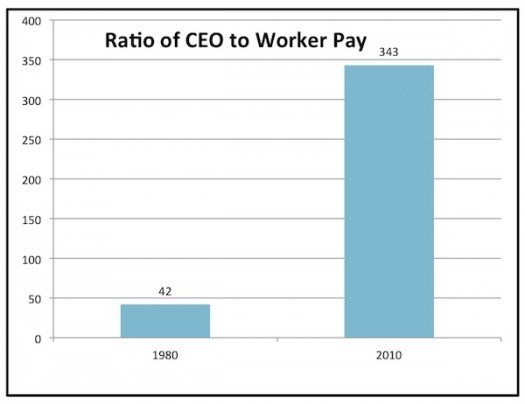
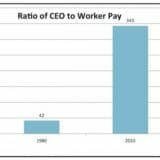
Image source: Center for Popular Economics
When Peter Drucker was writing about executive compensation in the 1970s, his purpose was to puncture some of the myths about it. Executives, Drucker pointed out at the time, weren’t getting paid as much as people seemed to think. At most companies, the ratio of CEO pay to average employee pay was less than 25-to-1, while most Americans erroneously believed it to be 50-to-1 or 100-to-1.
But that would all change in the following decades. Today, the CEOs of the largest U.S. companies make 354 times more than the average rank-and-file worker. At some companies— including Abercrombie & Fitch, CBS and Nike—the ratio is in excess of 1,000 to 1. (See this chart from Bloomberg for details.)
As far as Drucker was concerned, this sort of pay structure was absurd. “It is surely not professional altogether for people who are employees and not “owners” to pay themselves salaries and bonuses greatly in excess of what their own colleagues,


Representative Paul Ryan is back to his old tricks, demonizing people who rely on government to improve their lives. This week, his target was food stamp recipients.
He’s already come out in favor of $20 billion in cuts that will throw an estimated two million children, elderly, and disabled Americans off food stamps. But now Ryan — the millionaire Wisconsin Congressman who was Mitt Romney’s VP running mate last year — is pushing an amendment to eliminate food stamps for people who have $2,000 in savings, or a car worth more than $5,000.
The Congressional Budget Office found that this would throw 1.8 million people off of the program. The Hill reported, “Most of these would be low-income seniors and working families with children. These families typically live paycheck to paycheck. Denying them the ability to save for emergencies, such as fixing a car,
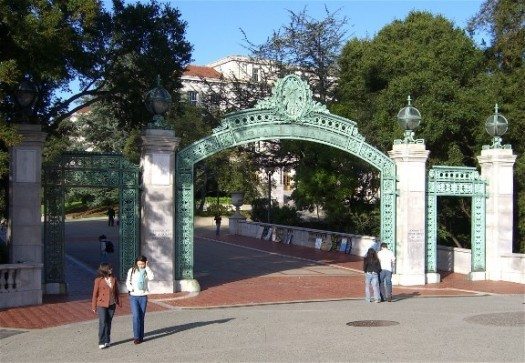

Two decades ago, this week’s report that New York University President John Sexton got a $1 million loan from the school to purchase a Fire Island vacation home would have been a national scandal. Today, it is a sign of the times. As young people graduate college facing crushing debt, college presidents, even in public schools like the University of California, are living high on the hog. NYU alone has given over 100 faculty large loans, and its former law school dean got $5.7 million for a townhouse in the West Village and a 65-acre second home in rural Litchfield County.
This disconnect between economically struggling students and privileged college presidents is deplorable. Yet school’s governance by elite-dominated boards perpetuates this staggering inequality. Activists need to find ways to prevent students from subsidizing these lavish administrator salaries, and legislation, civil disobedience and public shaming may all be necessary.
Slash Schools,
» Read more about: College Presidents Are Treated Like Wall Street CEOs »


The blowback from getting high for some people is starkly simple: Americans want drugs that ship through Mexico, and the resulting crime surrounding this commerce exacts a toll on both sides of that frontier. The devastation, of course, has been far worse in Mexico, where cartels battle each other, as well as the government and innocent citizens, in a hurricane of violence that seems to be surging out of control.
A delegation of Los Angeles writers and artists recently traveled to Mexico City and Cuernavaca for several days of dialogue about the crisis. The L.A. group, which included author and professor Rubén Martínez, playwright-activist Raquel Gutiérrez and multimedia artist Rafa Esparza, heard how Mexico’s artists face the violence of the drug war. They spoke to poet Javier Sicilia, whose son was murdered in a cartel-related crime in 2011; critic and “artivist” Mónica Mayer; singer-songwriter Leticia Servín; poets Gabriela Jáuregui and María Rivera, and journalist Daniel Hernández,
» Read more about: Death Without Borders: Art and Mexico’s Drug War »
The ripples continue to spread from Frying Pan News reporter Gary Cohn’s piece on California’s enterprise zones, which were created in 1984 to help small businesses and create jobs by giving tax breaks to companies in the state’s economically depressed regions. Last Friday the Fresno Bee called for reform of the zones and today a Los Angeles Times editorial declared that nothing less than pulling the plug on the program would do.
The zones, said the Times, “were a well-intentioned experiment that was tried, failed and has been kept around too long. This is one experiment that should be ended, not merely mended.”
Cohn’s May 28 article appeared at the same time Governor Jerry Brown was maneuvering to reform the program out of existence. The Frying Pan News story emphasized that 61 percent of the enterprise program’s beneficiaries are companies with more than $1 billion in assets,
» Read more about: L.A. Times: Pull the Plug on State’s Enterprise Zones »


Saturday, June 22, Grand Performances will present Inequality for All, a film directed by Jacob Kornbluth in which former U.S. Labor Secretary Robert Reich examines America’s widening economic gap. The documentary, part of L.A. Film Fest, screens free at 8:15 p.m., outdoors, at California Plaza. Frying Pan News reporter Luke Dowling sat down with Michael Alexander, Grand Performances’ Executive and Artistic Director, to ask about the event and Alexander’s vision for Los Angeles’ arts landscape under the city’s new mayor.
Frying Pan News: Why did you decide to include a documentary about economic inequality this season?
Michael Alexander: Documentary filmmaking is an art and some of the documentary filmmakers that we’ve worked with have also touched on the very issues that face people in their everyday lives. What are people going to decide to do for themselves?
» Read more about: Bridging Great Divides: A Talk With Michael Alexander »


How are you tonight, 7-Eleven? with your smell
of departure and annoyance, your white bread, your drain cleaners,
your puddings, your cockroaches fanning out over the parking lot
like glossy marzipan soldiers lugging fearsome shadows.
It must be lovely to watch for dawn
coming over the EverTrust Bank and the Chevron station,
it must be trying
for the lively man with the turban (sales associate #33323)
to hang out with the seven moving objects of the sky,
the eleven ounces of the heart
and the sturdy sixteen-year-olds
picking their noses by the soda fountain.
7-Eleven—benign, broad-minded firebrand of night—
the great inward journey begins with you,
inexhaustible Christmas of green red orange HELP
WANTED Do we think we understand you, 7-Eleven? How sweet
the industrious freezer, the implacable milk,
the pounds of glaze,


Walmart’s expansion strategy for Los Angeles and other urban areas has been to avoid public oversight by choosing real estate that doesn’t require public review – and, where possible, to secure public subsidies, often with little public scrutiny.
This is exactly what happened in both Covina and Cathedral City. In 1993, Walmart negotiated an intricate deal with the City of Covina’s redevelopment agency that resulted in the company making a tidy profit of $4.1 million. Walmart made a $10.8 million loan to the CRA to purchase several plots of land for the corporation, which was then sold back to Walmart at the discounted price of $6.7 million. In this way, Walmart effectively received a $4.1 million subsidy from taxpayers to develop the land. Similarly, in 1995, Walmart was reimbursed by Cathedral City for $850,000 for “infrastructure improvements,” but on the day that taxpayers recovered this subsidy,
» Read more about: Unlevel Playing Field: How Taxpayers Foot Walmart’s Bills »


One of the biggest issues that the Affordable Care Act (ACA) is meant to tackle is the lack of health coverage among low-wage workers. While there is good news for many low-wage workers in the new law, many others will still find themselves locked out of access to affordable coverage. Solving their concerns will be one more part of the huge challenge of confronting the power of mammoth low-wage employers in the new economy.
There has been a lot of coverage about the potential for fast food chains and other employers to cut the hours of some of their employees to under 30 a week in order to avoid having to offer them health coverage. To the extent that employers do cut back hours, it will accelerate a long trend toward part-time low wage work; part-timers increased from 17 percent to 22 percent of the workforce just from 2007 to 2011.


On Tuesday the Los Angeles City Council voted, nearly unanimously, to implement a ban on all single-use plastic bags. Plastic bags have become an eyesore around our neighborhoods, but more importantly, they have been costing the City millions of dollars in clean-up. Despite these efforts, many still wind up in our sewer systems, with all too many flowing to the sea where marine life is harmed and various waterways themselves become polluted.
The ban has been in the works since current Councilmember Ed Reyes introduced the idea nearly 10 years ago. This last year many hearings were held over many months, during which time stakeholders passionately presented the measure’s pros and cons. If it were not for the commitment of Councilmembers José Huizar and Paul Koretz, this ordinance would never have succeeded.
The most significant aspects of this measure are as follows:

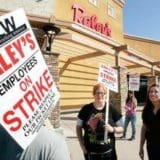
There’s power in the picket line. And employers know it.
That’s why, in 2008, Ralphs Grocery Company sued to have union picketers removed from the front of one of its non-union stores. But California has explicit laws to protect labor-related speech, and the court denied the request by Ralphs.
But that hasn’t stopped the grocery chain from continuing its courtroom battle to silence workers – even though they’ve lost just about every case. Last December, California’s Supreme Court upheld the ruling in favor of the picketers. Speaking for the California Supreme Court’s 6-1 ruling in the Union’s favor, Justice Joyce Kennard wrote that the 1975 state law and follow-up legislation passed in 1999 are
“. . . justified by the state’s interest in promoting collective bargaining to resolve labor disputes, and the understanding that the area outside the entrance of the targeted business often is the most effective point of persuasion.”
And last week,